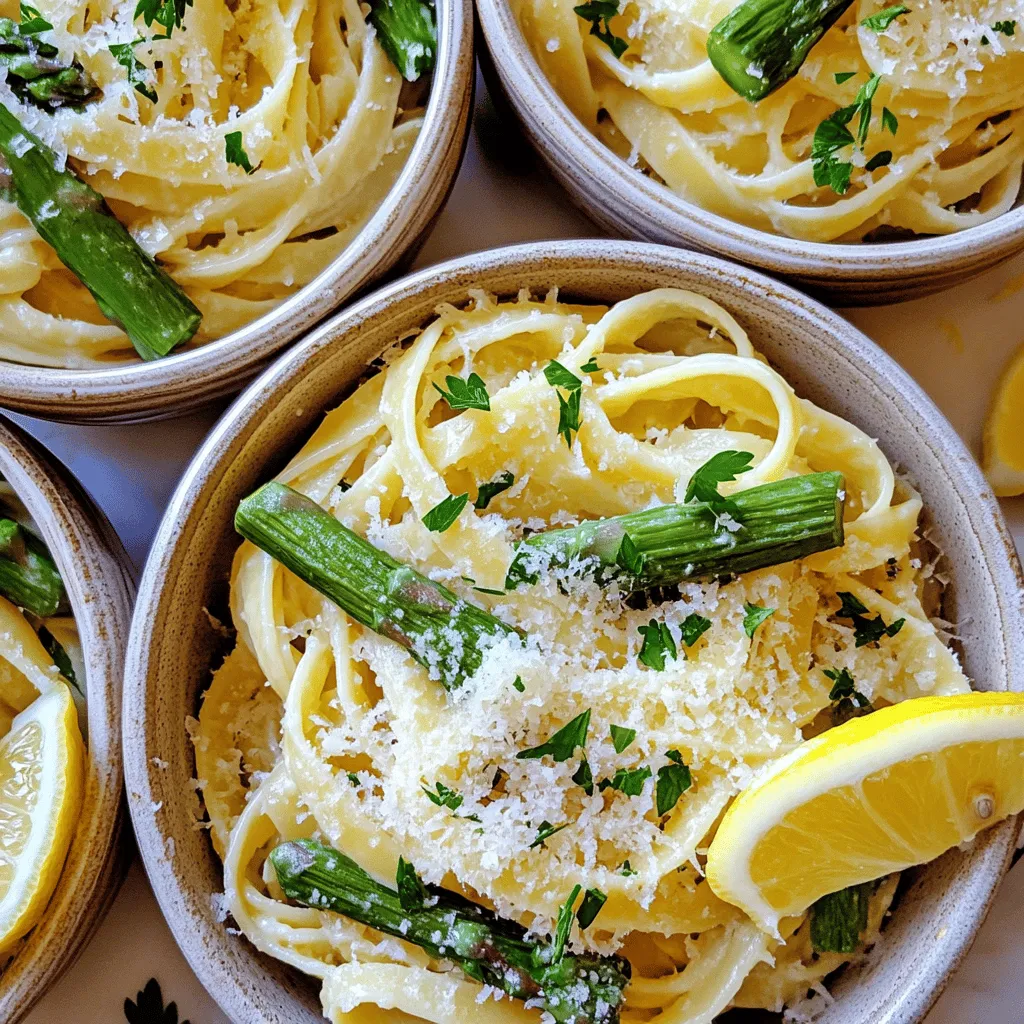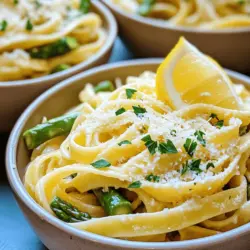Are you ready to make a fresh and tasty dish? Lemon Parmesan Asparagus Pasta combines bright flavors and easy steps. This delightful recipe highlights crunchy asparagus and zesty lemon, topped with creamy Parmesan. Whether you’re cooking for family or a special friend, this pasta will impress! Let’s dive into the simple ingredients and quick steps to bring this delicious meal to your table today. You won’t want to miss this!
Ingredients
List of Ingredients
- 8 ounces fettuccine or linguine
- 1 pound asparagus, trimmed and cut into 2-inch pieces
- 2 tablespoons olive oil
- 3 cloves garlic, minced
- 1 lemon (zest and juice)
- 1 cup grated Parmesan cheese
- Salt and black pepper to taste
- ¼ teaspoon red pepper flakes (optional)
- Fresh parsley, chopped for garnish
Using fresh ingredients makes this dish shine. The fettuccine or linguine gives a lovely base. Asparagus adds a crisp texture and bright flavor. Olive oil adds richness, while garlic gives a warm aroma. The lemon juice and zest bring a fresh zing. Grated Parmesan cheese ties it all together with a savory touch. You can add salt and pepper to taste. If you like a bit of heat, sprinkle in red pepper flakes. Finally, fresh parsley adds a pop of color.
Each ingredient plays a role in creating a balanced dish. Fresh ingredients not only taste better but also offer more nutrients. You can easily find these items at your local grocery store.
Step-by-Step Instructions
Cooking the Pasta
Start by boiling a large pot of salted water. Add 8 ounces of fettuccine or linguine to the pot. Cook it according to the package instructions until it is al dente. This usually takes around 8-10 minutes. Remember to save about 1 cup of pasta water before you drain the pasta. Set the drained pasta aside for later.
Blanching the Asparagus
Next, take the same pot and add your trimmed asparagus pieces. Cook them for about 3-4 minutes. You want them to be bright green and tender-crisp. After cooking, quickly transfer the asparagus to a bowl of ice water. This ice bath stops the cooking process and keeps the asparagus crunchy. Drain the asparagus and set it aside.
Sautéing the Garlic
Now, grab a large skillet and heat 2 tablespoons of olive oil over medium heat. Once the oil is warm, add 3 cloves of minced garlic. Sauté the garlic for about 1 minute. You want it to smell fragrant, but be careful not to burn it. A burned garlic can ruin your dish.
Combining Ingredients
In the skillet with the garlic, add the cooked pasta and blanched asparagus. Pour in the juice of 1 lemon and add the lemon zest too. Toss everything together gently. You want to mix it well so that the flavors blend.
Adding Cheese and Seasoning
Now for the best part—cheese! Gradually sprinkle in 1 cup of grated Parmesan cheese while tossing the pasta. If the mixture feels dry, add some of the reserved pasta water. Keep adding until you reach a creamy consistency. Season with salt, black pepper, and if you like it spicy, add ¼ teaspoon of red pepper flakes.
Serving the Dish
Once everything is mixed well and heated through, it’s time to serve. Plate the pasta in shallow bowls. For a nice touch, garnish with extra Parmesan cheese and a sprinkle of fresh chopped parsley. You can also add a lemon wedge on the side for a pop of color. Enjoy your Lemon Parmesan Asparagus Pasta!
Tips & Tricks
Perfecting the Texture
To make the best Lemon Parmesan Asparagus Pasta, cook your pasta until it is al dente. This means it should be firm but not hard. Al dente pasta holds up better when mixed with the sauce. It also absorbs flavors well.
Next, balance the pasta with the sauce’s consistency. If your pasta seems too dry, use some reserved pasta water. This starchy water helps the sauce stick and adds flavor.
Enhancing Flavor
For extra flavor, consider adding fresh herbs. Basil or thyme can elevate your dish. You can also sprinkle in some black pepper for a bit of heat.
Always use freshly grated Parmesan cheese when possible. Pre-packaged cheese often lacks flavor and can be grainy. Freshly grated cheese melts better and adds a rich taste.
Adjusting for Dietary Needs
If you need gluten-free pasta, many options exist. Brown rice or chickpea pasta works well in this dish.
For vegan options, use plant-based cheese. Look for brands that melt well. Nutritional yeast is also a great option. It adds a cheesy flavor without dairy.

Variations
Protein Add-ins
You can easily boost your Lemon Parmesan Asparagus Pasta with protein. Adding chicken is a great choice. Simply grill or sauté it, then slice it into strips. Shrimp also works perfectly; just cook them until they turn pink. If you want a plant-based option, try adding tofu. Press and cube the tofu, then sauté until golden. Each of these proteins adds flavor and makes the meal heartier.
Vegetable Substitutions
Feel free to switch up the veggies in your dish! Peas add a nice sweetness and pop of color. Spinach is another great option; it wilts quickly and mixes well with the pasta. Bell peppers bring a crunchy texture and bright flavor. You can use one or mix several for a colorful twist. Each of these vegetables enhances the meal’s nutrition and taste.
Flavor Twists
Experimenting with citrus can give your dish a fun twist! While lemon is classic, try adding lime juice for a zesty kick. Orange also adds a sweet note that pairs well with the Parmesan cheese. Just remember to adjust the amounts to keep the balance. These small changes can refresh your pasta dish and keep it exciting.
Storage Info
Refrigerating Leftovers
After enjoying your Lemon Parmesan Asparagus Pasta, let it cool down. Place the leftover pasta in an airtight container. This keeps the flavors fresh. Store it in the fridge. It will stay good for about three days. To reheat, use a skillet over medium heat. Add a splash of water or olive oil. Stir often to warm it through without drying it out.
Freezing Portions
Freezing is a great option for this tasty dish. Use freezer-safe containers for best results. Portion out the pasta and let it cool first. Seal tightly to avoid freezer burn. It can last up to three months in the freezer. When you’re ready to eat, thaw it overnight in the fridge. Reheat it gently on the stove or in the microwave.
Shelf Life
In the fridge, your Lemon Parmesan Asparagus Pasta lasts about three days. If you freeze it, the shelf life extends to three months. Always check for any off smells or changes in texture before eating. Fresh food is always best, so try to eat it within these time frames for the best taste.
FAQs
How do you make Lemon Parmesan Asparagus Pasta gluten-free?
To make Lemon Parmesan Asparagus Pasta gluten-free, choose a gluten-free pasta. Good options include brown rice pasta, chickpea pasta, or quinoa pasta. These types cook well and keep the dish tasty. Always check the package for cooking times.
Can I use frozen asparagus instead of fresh?
Yes, you can use frozen asparagus! Just thaw it first. To thaw, place it in warm water for a few minutes. After thawing, pat it dry. You can skip the blanching step. Add the thawed asparagus directly to the skillet with garlic. Cook until heated through.
What can I serve with Lemon Parmesan Asparagus Pasta?
This pasta pairs well with many sides. Try a fresh salad with lemon vinaigrette. Garlic bread is also a great choice. For protein, grilled chicken or shrimp complements the dish nicely. A light white wine can enhance the flavors too.
How do I make the pasta creamy without heavy cream?
You can make the pasta creamy using cheese and pasta water. After adding the grated Parmesan, mix well. If the pasta seems dry, slowly add reserved pasta water. This creates a rich, creamy texture. The starchy water helps bind everything together.
This recipe for Lemon Parmesan Asparagus Pasta is simple and fresh. You’ve learned how to cook the pasta, blanch the asparagus, and combine all the flavors. Remember to keep the pasta al dente for the best texture. Experiment with different proteins or veggies to make it your own. Proper storage will keep leftovers tasty for days, so don’t hesitate to make extra. Enjoy this delightful dish that brings bright flavors to your table. Happy cooking!


